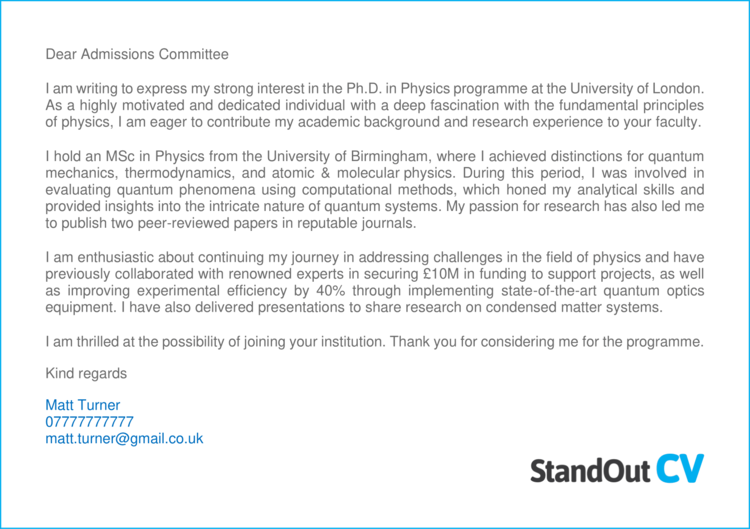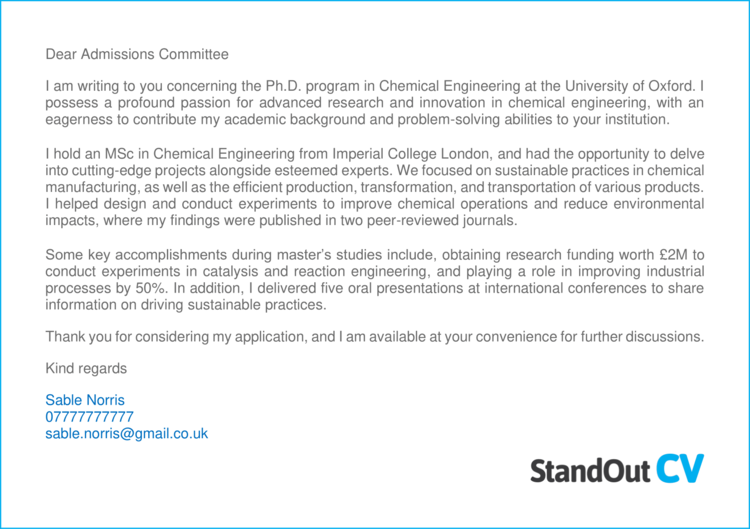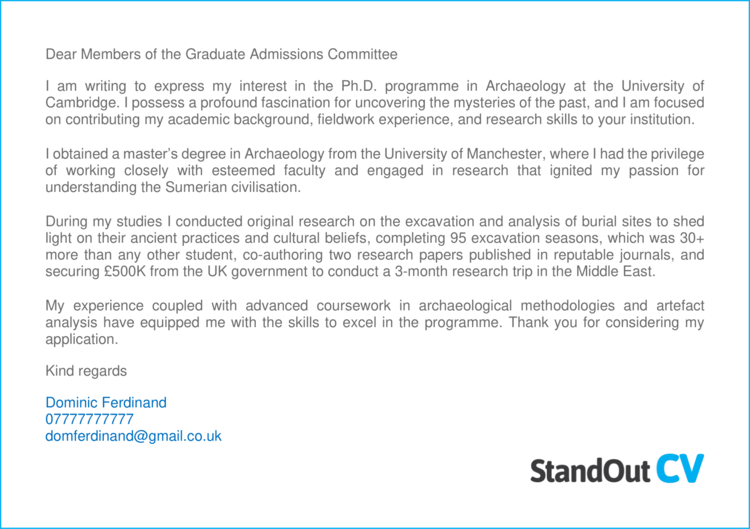How to Write a PhD Cover Letter (With an Example)
In this article, I’ll guide you through how to write a compelling PhD motivation letter, explain what it entails, and provide tips to help you stand out based on my experience.
- ⏳ 3-5 min read
- Applying to Study Abroad


Page Content
Pursuing a PhD is a significant step in your academic and professional career. It requires dedication, passion, and a strong commitment to research. One of the key documents that can set you apart from other candidates is a motivation letter for a PhD application.
What is a motivation letter for PhD?
A motivation letter for a PhD is preferably 1page document that you add to anapplication to a doctoral program or if you apply for a PhD position in a particular laboratory. Its main goal is to provide a narrative that connects your academic background, research interests, and career aspirations to the specific PhD program you are applying for. Unlike a CV, which lists your qualifications and experience, a motivation letter allows you to express why you are passionate about your field of study and how you align with the program’s goals.
In this letter, you need to demonstrate your knowledge of the subject, readiness for independent research, and how you fit within the department or laboratory. It's your chance to convince the admissions committee or a Principal Investigator (PI) that you are the ideal candidate for their program.
Why write a motivation letter for a PhD?
Writing a motivation letter is crucial for several reasons:
- It demonstrates your passion and commitment to the field. A well-writtenmotivation letter shows that you are deeply interested in the subject and have a clear vision for your research.
- It highlights your research interests and how they align with the program. Admissions committees or PIs look for candidates whose research goals and experience align with the expertise of their laboratory and the department’s focus areas.
Since many PhD positionsreceive hundreds of applications, a strong motivation letter can help you stand out by showing your unique perspective and enthusiasm for your chosen field.
How to write a motivation letter for PhD
Introduction: who you are and your academic background.
Start your letter with a brief introduction about yourself. Mention your name, current academic standing, and the degree you have obtained. Include any relevant details about your academic background, such as specific the name of you supervisor during the MCs program, research experience, significant academic achievements, or professional accomplishments that are directly related to your PhD field.
If you’re aiming to work with a particular PI, your chances of having your email read will be higher if you mention someone you’ve worked with before in the first line. In my experience, the best results came when I started a motivational letter by mentioning a mutual acquaintance.
Some PhD programs, particularly in Life Sciences, offer a salary. However, competition for scholarships that cover at least part of your salary is tough. If you’re fortunate enough to secure one, it’sa good idea to mention it in the first paragraph of your application to catch the attention of the PI.
Example: "I did my Master's thesis in the laboratory of Dr. Anderson at XYZ University, where I studied how mutations in gene Kled to development of orphan diseases in children. Working there, I obtained excellent skills in Biochemistry and Molecular Biology methods such as molecular cloning, PCR and western blotting. Throughout mystudies, I have been deeply engaged in research that explores the genetic basis of rare diseases and I would like to continue my research in your laboratory. I have obtained a scholarship from ABC for 4 years and would be happy to discuss my candidacy to do this project in your laboratory."
Research interests and future goals
This section should explain your research interests in detail. What topics are you passionate about, and why? How do these interests align with the specific PhD program you're applying to? Discuss your long-term career goals and how the PhD will help you achieve them.To increase your chances of being accepted, do the homework and read thoroughly about research a specific laboratory does, and how you can contribute.
Example: "My primary research interest lies in understanding the genetic factors that contribute to neurodegenerative diseases. I am particularly drawn to your program because of the innovative research being conducted by Dr. Smith’s lab on gene therapy approaches, which aligns perfectly with my goal of contributing to groundbreaking treatments for neurological disorders."
Previous research experience and skills
Highlight any relevant research experience, including any publications, conferences, or significant projects. This is where you demonstrate your preparedness for a PhD. Discuss specific skills you have acquired that will help you succeed in the program, such as data analysis, lab techniques, or academic writing.
Example: "During my Master's program, I conducted research on the role of epigenetics in cancer development, which was published in the Journal of Molecular Biology. I have also presented my findings at the International Conference on Genetic Research, which further refined my research and presentation skills."
Demonstrating your fit for the program
Discuss personal qualities or experiences that make you a good fit for the program. Explain how you can contribute to the department or laboratory through your unique perspective, skills, or collaborative approach.
It’sbeneficial if you can prepare a project proposal, PIs appreciate independent students the most.At the end, after defending your PhD thesis, you become a researcher who must demonstratethe ability to conduct independent research.
Example: "I am a proactive researcher with a collaborative spirit, thriving in teamwork. I am confident that my background in molecular genetics and my commitment to scientific inquiry will make me a valuable addition to your research team. I would like to discuss the idea of how protein A interacts with protein B in cell type X and how it leads to mutation in gene K".
PhD cover letter example
Here is an example of a good PhD motivation letter to give you a better idea of how to structure yours:
[Your Name] [Email Address] [Phone Number]
Dear Members of the Admissions Committee / Dear Dr. Trinity,
I am writing to express my interest in the PhD program in [Field] at [University Name]. As a recent graduate with a Master's degree in [Your Field] from [Your University], I am eager to continue my academic journey and contribute to groundbreaking research in [Specific Research Area]. My academic background in [Specific Field] and research experience in [Specific Research Focus] have equipped me with a solid foundation to excel in this program.
[Continue with your personal motivations, research interests, alignment with the program, relevant experiences, and conclusion.]
Thank you for considering my application. I am looking forward to the opportunity to discuss how my background, skills, and passion align with your program’s goals.
Sincerely, [Your Name]
Tips for writing an effective motivation letter
- Be specific and tailor your letter: Customize your letter for each program or PI who you write to. Avoid generic statements.
- Maintain a professional tone: Keep your language formal and respectful. Avoid casual or overly familiar language.
- Proofread and edit thoroughly: Check for grammar and spelling errors. Don’t forget to cut in paragraphs for the convenience of a reader.
- Seek feedback from mentors or peers.
Common pitfalls to avoid
- Being too general or vague: Make sure your letter is specific to the program or laboratory and highlights your unique qualifications.
- Excessive flattery: Stay genuine and avoid over-the-top praise for the program or faculty.
- Ignoring instructions or guidelines: Follow the application guidelines carefully to show that you can follow directions.
Writing a compelling motivation letter for a PhD program is a critical step in your application process. Start early, revise often, and seek feedback to refine your letter. A well-crafted motivation letter can make a significant difference in setting you apart from other candidates.

Natalia Akkuratova Author
Natalia holds a PhD in Medical Science from the Karolinska Institute in Sweden and has 13 years of academic experience, including teaching and student mentorship. After defending her PhD, she worked as a digital marketing specialist at Keystone Education Group.
Find a program in these categories
- Doctoral Degrees
Read related articles

How to Study Abroad Guide: What Can I Study Abroad?
July 2024 Master's Degree Bachelor's Degree Preparing to Study Abroad Associate's Degree PhD

Tips for Studying Abroad in the Netherlands
July 2024 Study Abroad in the Netherlands Study Abroad in Europe Applying to Study Abroad During Study Abroad Deciding Where to Study


What Americans Need to Know to Study Abroad
July 2024 Information for American Students Preparing to Study Abroad Applying to Study Abroad Study Abroad Financing
PHD Application cover letter examples
As the highest postgraduate qualification you can achieve, it’s no wonder that most PhD programs require a cover letter as part of the application process.
So, if you’re hoping to complete your doctorate, you need to brush up on your writing skills and prove why you deserve a place in the program.
To help you do that, we’ve put together this comprehensive guide, complete with PhD cover letter examples to support your application.
CV templates
PHD Application cover letter example 1

Build your CV now
PHD Application cover letter example 2

PHD Application cover letter example 3

The example cover letters here should give you a good general idea on how your PHD Application cover letter should be formatted and written.
The rest of this guide gives more specific guidance on how to create your own cover letter in this format, and even includes some templates you can copy and paste.
How to write a PHD Application cover letter
A simple step-by-step guide to writing your very own winning cover letter.

Write your cover letter in the body of an email/message
When writing your PHD Application cover letter, it’s best to type the content into the body of your email (or the job site messaging system) and not to attach the cover letter as a separate document.
This ensures that your cover letter gets seen as soon as a recruiter or employer opens your message.
If you attach the cover letter as a document, you’re making the reader go through an unnecessary step of opening the document before reading it.
If it’s in the body of the message itself, it will be seen instantly, which hugely increases the chances of it being read.

Start with a friendly greeting

Start you cover letter with a greeting that is professional but friendly.
This will build rapport with the recruiter whilst showing your professionalism.
- Hi, hope you’re well
- Hi [insert recruiter name]
- Hi [insert department/team name]
Avoid overly formal greetings like “Dear sir/madam ” unless applying to very traditional companies.
How to find the contact’s name?
Addressing the recruitment contact by name is an excellent way to start building a strong relationship. If it is not listed in the job advert, try these methods to find it.
- Check out the company website and look at their About page. If you see a hiring manager, HR person or internal recruiter, use their name. You could also try to figure out who would be your manager in the role and use their name.
- Head to LinkedIn , search for the company and scan through the list of employees. Most professionals are on LinkedIn these days, so this is a good bet.
Identify the role you are applying for
Once you’ve opened up the cover letter with a warm greeting to start building a relationship, it is time to identify which role you want to apply for.
Recruiters are often managing multiple vacancies, so you need to ensure you apply to the correct one.
Be very specific and use a reference number if you can find one.
- I am interested in applying for the position of *specialist field PHD Applicant* with your company.
- I would like to apply for the role of Sales assistant (Ref: 406f57393)
- I would like to express my interest in the customer service vacancy within your retail department
- I saw your advert for a junior project manager on Reed and would like to apply for the role.
See also: CV examples – how to write a CV – CV profiles
Highlight your suitability
The main purpose of your cover letter is to excite recruiters and make them eager to open your CV. And you achieve this by quickly demonstrating your suitability to the job you are applying for.
Take a look at the job adverts you are applying for, and make note of the most important skills being asked for.
Then, when you write your cover letter, make your suitability the focal point.
Explain how you meet the candidate requirements fully, and why you are so well suited to carry out the job.
This will give recruiters all the encouragement they need to open your CV and consider your application.

Keep it short and sharp
A good cover letter is short and sharp, getting to the point quickly with just enough information to grab the attention of recruiters.
Ideally your cover letter should be around 4-8 sentences long – anything longer will risk losing the attention of time-strapped recruiters and hiring managers .
Essentially you need to include just enough information to persuade the reader to open up your CV, where the in-depth details will sit.
Sign off professionally
To round of your CV, you should sign off with a professional signature.
This will give your cover letter a slick appearance and also give the recruiter all of the necessary contact information they need to get in touch with you.
The information to add should include:
- A friendly sign off – e.g. “Kindest regards”
- Your full name
- Phone number (one you can answer quickly)
- Email address
- Profession title
- Professional social network – e.g. LinkedIn
Here is an example signature;
Warm regards,
Jill North IT Project Manager 078837437373 [email protected] LinkedIn
Quick tip: To save yourself from having to write your signature every time you send a job application, you can save it within your email drafts, or on a separate documents that you could copy in.

What to include in your PHD Application cover letter
Here’s what kind of content you should include in your PHD Application cover letter…
The exact info will obviously depend on your industry and experience level, but these are the essentials.
- Your relevant experience – Where have you worked and what type of jobs have you held?
- Your qualifications – Let recruiters know about your highest level of qualification to show them you have the credentials for the job.
- The impact you have made – Show how your actions have made a positive impact on previous employers; perhaps you’ve saved them money or helped them to acquire new customers?
- Your reasons for moving – Hiring managers will want to know why you are leaving your current or previous role, so give them a brief explanation.
- Your availability – When can you start a new job ? Recruiters will want to know how soon they can get you on board.
Don’t forget to tailor these points to the requirements of the job advert for best results.
PHD Application cover letter templates
Copy and paste these PHD Application cover letter templates to get a head start on your own.
Dear Admissions Committee
I am writing to express my strong interest in the Ph.D. in Physics programme at the University of London. As a highly motivated and dedicated individual with a deep fascination with the fundamental principles of physics, I am eager to contribute my academic background and research experience to your faculty.
I hold an MSc in Physics from the University of Birmingham, where I achieved distinctions for quantum mechanics, thermodynamics, and atomic & molecular physics. During this period, I was involved in evaluating quantum phenomena using computational methods, which honed my analytical skills and provided insights into the intricate nature of quantum systems. My passion for research has also led me to publish two peer-reviewed papers in reputable journals.
I am enthusiastic about continuing my journey in addressing challenges in the field of physics and have previously collaborated with renowned experts in securing £10M in funding to support projects, as well as improving experimental efficiency by 40% through implementing state-of-the-art quantum optics equipment. I have also delivered presentations to share research on condensed matter systems.
I am thrilled at the possibility of joining your institution. Thank you for considering me for the programme.
Kind regards
Matt Turner
I am writing to you concerning the Ph.D. program in Chemical Engineering at the University of Oxford. I possess a profound passion for advanced research and innovation in chemical engineering, with an eagerness to contribute my academic background and problem-solving abilities to your institution.
I hold an MSc in Chemical Engineering from Imperial College London and had the opportunity to delve into cutting-edge projects alongside esteemed experts. We focused on sustainable practices in chemical manufacturing, as well as the efficient production, transformation, and transportation of various products. I helped design and conduct experiments to improve chemical operations and reduce environmental impacts, where my findings were published in two peer-reviewed journals.
Some key accomplishments during master’s studies include, obtaining research funding worth £2M to conduct experiments in catalysis and reaction engineering, and playing a role in improving industrial processes by 50%. In addition, I delivered five oral presentations at international conferences to share information on driving sustainable practices.
Thank you for considering my application, and I am available at your convenience for further discussions.
Sable Norris
Dear Members of the Graduate Admissions Committee
I am writing to express my interest in the Ph.D. programme in Archaeology at the University of Cambridge. I possess a profound fascination for uncovering the mysteries of the past, and I am focused on contributing my academic background, fieldwork experience, and research skills to your institution.
I obtained a master’s degree in Archaeology from the University of Manchester, where I had the privilege of working closely with esteemed faculty and engaged in research that ignited my passion for understanding the Sumerian civilisation.
During my studies I conducted original research on the excavation and analysis of burial sites to shed light on their ancient practices and cultural beliefs, completing 95 excavation seasons, which was 30+ more than any other student, co-authoring two research papers published in reputable journals, and securing £500K from the UK government to conduct a 3-month research trip in the Middle East.
My experience coupled with advanced coursework in archaeological methodologies and artefact analysis have equipped me with the skills to excel in the programme. Thank you for considering my application.
Dominic Ferdinand
Writing an impressive cover letter is a crucial step in landing a place on a PHD, so taking the time to perfect it is well worth while.
By following the tips and examples above you will be able to create an eye-catching cover letter that will wow recruiters and ensure your CV gets read – leading to more job interviews for you.
Good luck with your job search!

IMAGES
VIDEO
COMMENTS
An academic cover letter is a document that PhD candidates submit alongside their academic CV when applying for a PhD. Essentially, it's a cover letter for a PhD application. It's not exactly the same as your regular business cover letter. Nor is it the same as a personal statement or a motivation letter. The purpose …
PhD cover letter example. Here is an example of a good PhD motivation letter to give you a better idea of how to structure yours: [Your Name] [Email Address] [Phone Number] …
Some formatting pointers: There is no single best format. Refer to samples for ideas, but craft your CV to best reflect you and your unique accomplishments. Unlike a resume, there is no …
Introduction: Open your cover letter by highlighting your enthusiasm for the specific PhD program and outline the most relevant elements of your research experience, academic …
A well-crafted PhD cover letter highlights your educational credentials, research experience, relevant skills, and passion for the field. Use each section of the cover letter to showcase your …
A PhD cover letter is a counterpart to a CV submitted as part of an application for a PhD programme. It is a short essay addressed to a specific individual and written in prose. It …